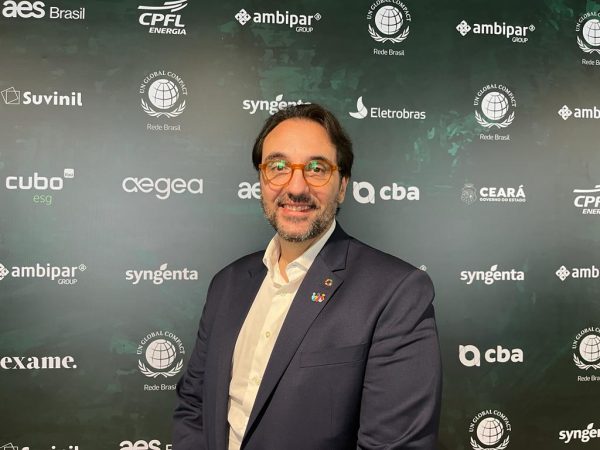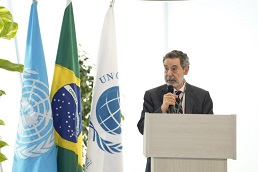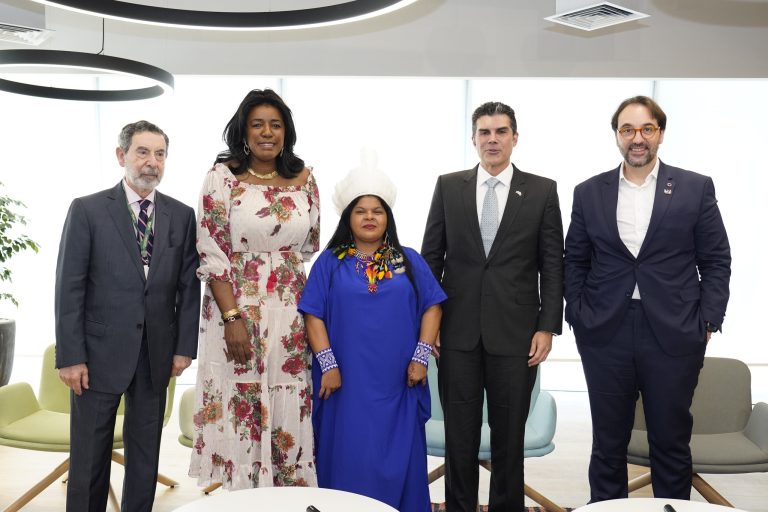Dubai – UN Global Compact Brazil launched on Friday (8) on the sidelines of Dubai’s COP28 The Green Wave Platform that aims to be a marketplace for connecting businesses that seek to reduce and even zero emissions to green solution providers in order to fast-track net zero greenhouse gas emission commitments.
In an interview with ANBA, Global Compact CEO Carlo Pereira said the platform already has 850 service and product providers registered and that they aim to reach 2,500 companies by the end of the year.
“It’s a marketplace. If a company needs to reduce their emissions, it first has to do take stock to learn what are their emission sources. And who will provide this service to map out its emission sources, and once identified, who will provide the service to reduce them. On the platform, you find it all and make the match your company needs,” Pereira explained.
The platform is in line with the Net-Zero Ambition, which aims to reach carbon neutrality by 2050 and reduce carbon emissions by 46% by 2050.

“Many companies say they want to reduce or neutralize emissions, but they don’t know how much they emit or what are their main emission sources. The Net Zero movement thinks of a series of commitments so that companies can reduce their emissions and neutralize them in the future,” he said.
The launch of the program took place on the sidelines of COP28 at the Global Compact’s event “Transition in the Global South: Building a Net-Zero Economy” which addressed topics of mitigation, adaptation and means of implementation.
The platform has two leading goals. The first is evaluating the climate impact with a tool that allows companies to calculate the CO2 emission potential and other climate indicators of their products or services. The calculator encompasses all key sectors of the green economy, including forests and land use, agriculture and food systems, water and sanitation, logistics and mobility, energy and biofuels, waste management, industry, and financial sector.
The second goal is to bring about connections between suppliers and demanders of green solutions, operating as a green business network and providing resources to facilitate these connections, including a green business database, networking opportunities, and relationship events.
Ambition 2030 Strategy
Ambipar, a Brazil-based environmental management global company, said at the event it was the first company to commit to all of ten movements of the Ambition 2030 strategy of the UN Global Compact Brazil established to fast-track the targets proposed by the UN 2030 Agenda, which addresses issues related to climate, water access, circular economy, the Amazon, mental health, human rights, anticorruption, and education.
Through October 2023, 261 companies had joined the movements and pledged to 458 commitments on various fronts. The targets are a call from the UN Global Compact Brazil for Brazilian companies to recognize the urgency and need for concrete actions, with targets and public commitments.

“Reaching the Sustainable Development Goals is a priority and engaging the private sector is fundamental for that. As a supporter of the Ambition 2030 and a company that commits to all its movements, we will be able to raise more debates and discussions and encourage the private sector to commit to the socio-environmental agenda. We have to get to work to make a difference in the future of the planet,” said Ambipar sustainability director Rafael Tello.
The Arab-Brazilian Chamber of Commerce (ABCC) has been a Global Compact Brazil signatory since 2020, and at COP28 it is an institutional partner of the Compact for appointments held with Arabs. During the event in Dubai, ABCC president Osmar Chohfi stressed the key role of companies in holding sustainable actions and the importance of engaging companies in global discussions on climate change.
“Sustainable production will effectively happen only if it engages companies. Green economy settings will be forged, and notions of responsible consumption will be consolidated in people’s minds through their policies and actions,” he said.
He emphasized Brazil’s potential in the green economy, including biodiversity reserves, clean energy, green hydrogen production, and efforts to incorporate the Amazonian peoples into the economy, and finished by stressing its availability to dialogue and to striking mutually beneficial partnerships in different business fields and ESG.
Sonia Guajajara
Brazil’s indigenous peoples minister Sonia Guajajara, who is the head of the Brazilian delegation at COP28, spoke at the Global Compact event and underscored the need to engage all sectors, including governments, the civil society, and private companies, for a fair transition towards a net-zero economy in the Global South.
“There will be no fair transition towards a net-zero economy without respecting human rights and the rights of indigenous peoples,” the minister stressed, speaking of the importance of integrating environment and human rights. She highlighted that the COP28 is a key event.

“We are in fact at a decisive COP: The COP that seeks to advance commitments that are more robust than those of Paris to prevent us from surpassing a global warming of 1.5°C. The COP that seeks to reach a global adaptation target, that creates the Loss and Damage Fund, that gets close to a major agreement to triple sustainable energies and that held the first high-level table on fair transition, where I represented Brazil as the head of the delegation. It’s decisive not only because of its urgency but because it pledges to new, improved targets, broadening the topics of the convention,” she said.
Guajajara finished by emphasized the urgency of the climate situation. “As many protesters around the world say, there is no planet B. Technical reports point that we’re very close to a tipping point. This COP seeks to further new agreements as well as mitigation and adaptation targets, with proposals that don’t leave anyone behind,” she said.
She also stressed the importance of the continuous support of the private sector and the Global Compact to advance on these initiatives. “The Compact is really crucial for these initiatives, and please count that the Lula administration and the Ministry of Indigenous Peoples will do what it takes to advance them,” she said.
Translated by Guilherme Miranda




